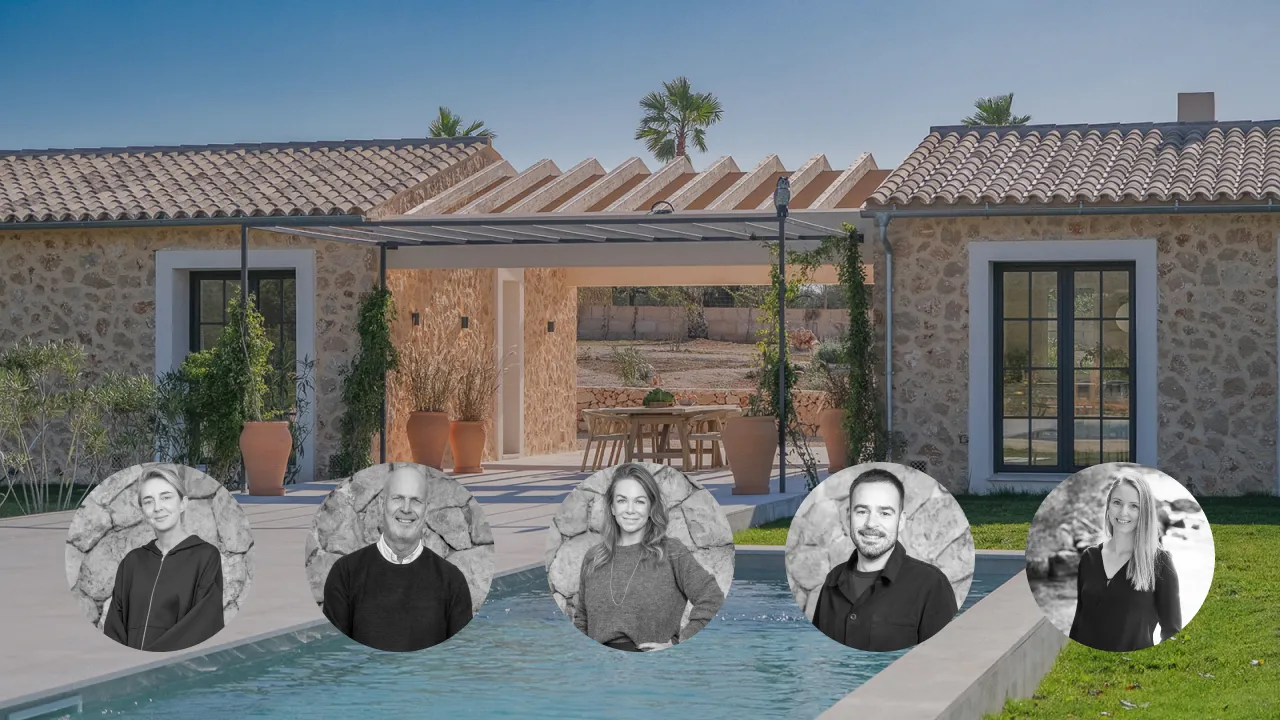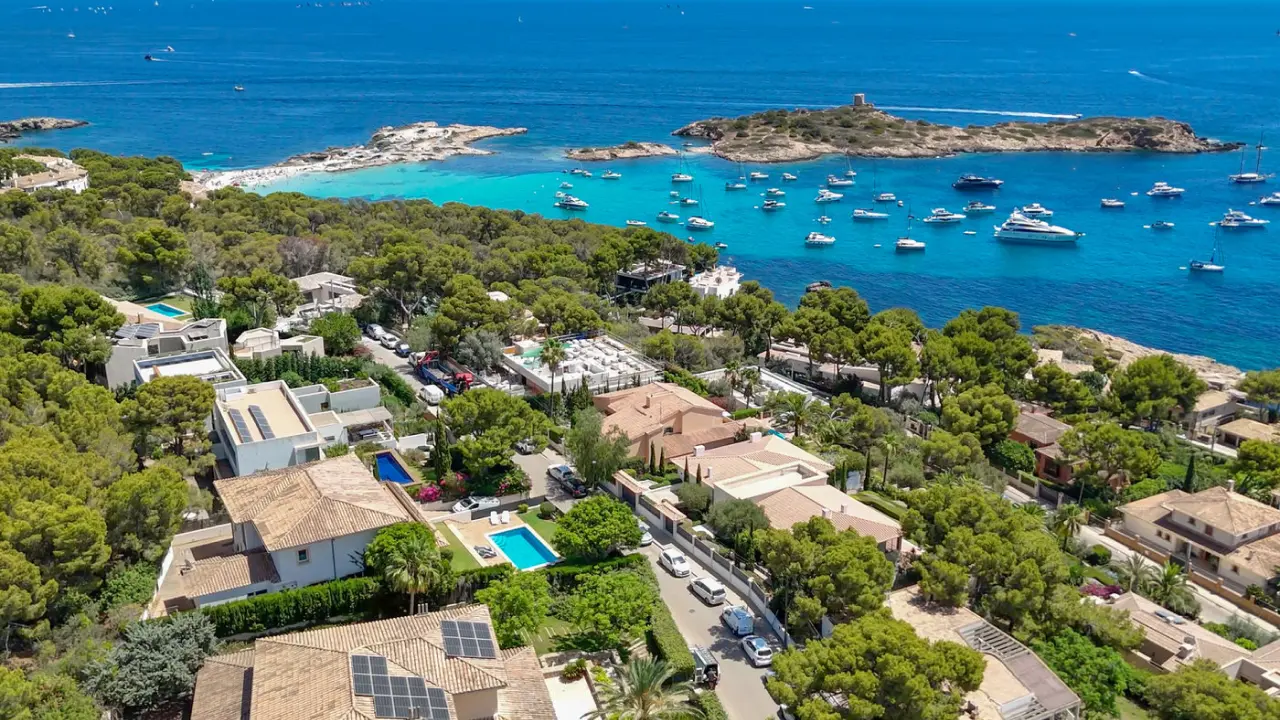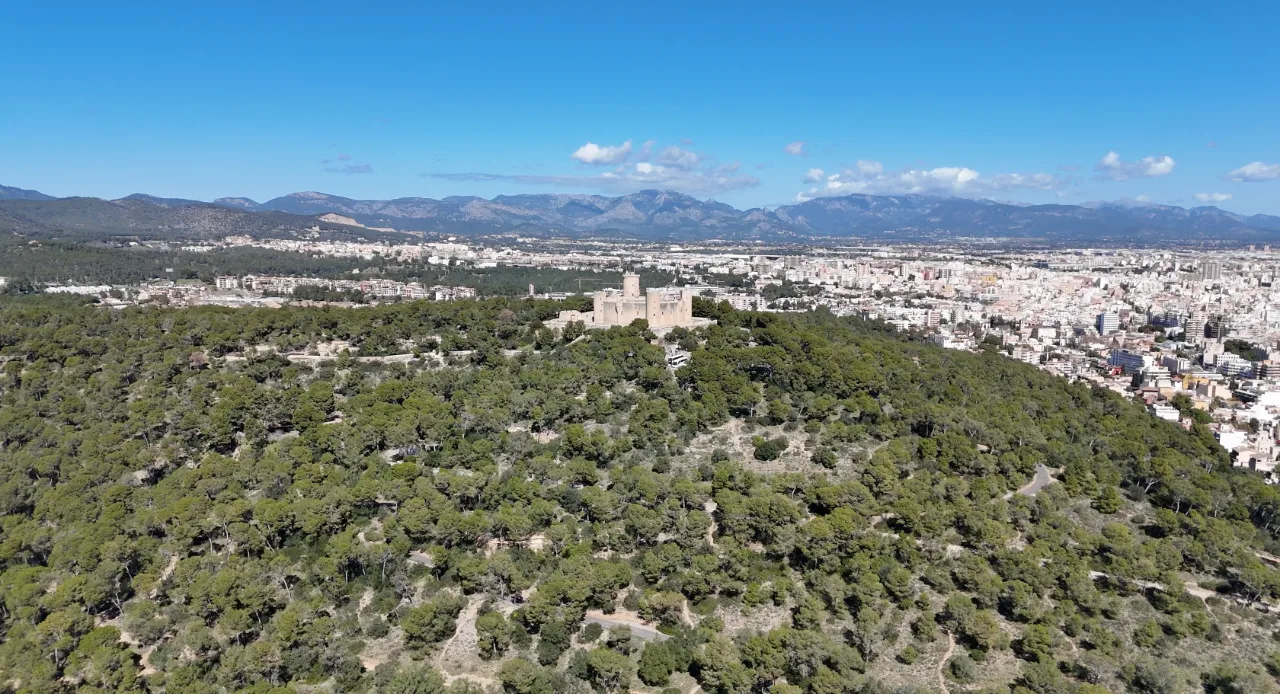In Short:
Good news: foreigners are free to buy and own property in Spain, including stunning villas and apartments on the island. Just make sure you get a NIE (foreigner’s identity card), sign your title deed with a Spanish notary, and register your ownership.
You’ll also want a local lawyer to check for hidden debts or zoning issues, and be prepared to pay around 10-13% in taxes and fees on top of the purchase price. Whether you’re buying to live, rent or invest, knowing the basics – from mortgages and income tax to inheritance and wealth tax – will ensure your Spanish property journey is smooth and stress-free.
Get in touch with an expert for free today ⇒
Spain’s enticing real estate market, known for its variety and attractive purchase prices, has drawn the interest of many in recent years. Whether attracted by the lure of a sun-drenched coastal retreat or an urban oasis in vibrant cities, navigating the intricacies of the Spanish real estate market and property laws is essential to a successful purchase. This comprehensive guide illuminates the essential laws and steps involved to ensure a smooth and informed buying experience.
Essential Laws on Buying Property in Spain
Buying property in Spain, as a foreigner, necessitates a firm grasp of the country’s legal framework governing real estate transactions, particularly the purchasing process, which often differ from those of your home country. While the process is generally straightforward, certain laws and regulations need careful consideration. These legal guidelines are designed to protect both the buyer and the seller, ensuring a secure and transparent transaction.
Understanding these laws is crucial for a seamless buying experience, from securing your dream property to fulfilling legal obligations. Awareness of these legal aspects will be your guide to a smooth and successful property purchase in Spain.
1. Legal Requirements for Foreign Buyers
One of the first steps for foreign buyers is obtaining a NIE number (Número de Identificación de Extranjeros) from the Spanish government. This unique identification number is essential for tax purposes and is required to open a bank account, which is highly recommended for managing property transactions.
EU citizens generally have it easier, benefiting from free movement and the right to reside in Spain. Non-EU citizens, however, may need to explore visa options, especially if they plan to live in Spain permanently. Having your legal standing clarified from the outset is vital before proceeding.
Why it matters: The NIE links your identity to all legal and financial actions in Spain. Without it, you cannot buy property, pay taxes, or set up essential services like utilities.
How to get it: Apply through a Spanish consulate in your home country or directly in Spain at a police station. It’s advisable to do this well before signing any contracts.
2. Navigating the Spanish Land Registry
The Spanish Land Registry is a public record of all property ownership, providing transparency and security for buyers. Before any property purchase, it is essential to conduct a title search in the Land Registry to verify ownership and check for any debts or encumbrances.
This due diligence helps ensure a clean purchase and prevents future legal disputes. The land registry also lists the property’s cadastral value, which is important information for calculating property taxes. A thorough check ensures that your investment is sound.
Why it matters: Registration officially recognizes you as the legal owner. Without it, your rights may not be protected against third-party claims.
How to comply: After signing the deed before a notary, your lawyer will file the property with the local Land Registry. This typically takes a few weeks and finalizes the legal transfer.
3. Understanding the Role of Notaries in Property Transactions
Notaries play a crucial role in Spanish property transactions. They act as impartial public officials, ensuring the legality and enforceability of the purchase agreement (Escritura de Compraventa). During the final signing, the notary reads aloud the contract, verifies identities, and collects applicable taxes and fees.
The notary’s involvement safeguards the interests of both parties and guarantees a legally binding transaction. Buyers should be prepared for notary fees, which are based on the property’s purchase price. Their expertise and neutrality are crucial for a secure and legally sound transaction.
Why it matters: Without notarization, the transaction isn’t legally recognized. The notary ensures compliance with Spanish law and protects both parties.
How to comply: Attend the signing in person or via power of attorney. Bring your NIE, proof of payment, and identification. Your lawyer can coordinate the entire process.
4. Key Real Estate Taxes Applicable to Buyers
Understanding Spain’s real estate taxes is paramount for any buyer. The primary tax levied is the Transfer Tax (ITP) for resale properties or VAT (IVA) for new constructions. ITP rates vary by region, usually ranging from 6% to 10% of the purchase price.
These property taxes are:
| Tax | Description | Rate in Mallorca |
|---|---|---|
| Transfer Tax (ITP) | On resale properties | 8–13% (tiered by value) |
| VAT (IVA) | On new properties | 10% |
| Stamp Duty (AJD) | On notarized deeds for new builds | 1.5–2% |
| Property Tax (IBI) | Annual local tax | 0.4–1.3% |
For example, buying a €1.5M resale villa may attract a blended ITP rate of around 10.6%. Taxes must be paid within 30 days of signing the deed. Your lawyer usually manages this payment.
Why it matters: These taxes can add 10–13% to the purchase price. Failing to pay them can delay registration or incur penalties.
How to comply: Your lawyer typically manages the tax payments. Ensure funds are available and deadlines met—most must be paid within 30 days of signing.
5. The Importance of a Property Lawyer
Engaging a real estate lawyer is strongly advised when purchasing a new home. In Spain, unpaid debts such as property taxes or community fees are tied to the property, not the previous owner.
A lawyer performs due diligence: verifying title, checking for debts or building violations, reviewing licenses, and ensuring the property matches its legal registration. They also confirm whether additional taxes like the municipal land tax (Plusvalía) are correctly allocated in the sale.
Legal fees are typically 1–2% of the property price and are a wise investment for peace of mind.
7. Restrictions on Property Types and Zones
Spain has specific zoning regulations and restrictions regarding property types and usage, which vary by region and municipality. Certain areas might have limitations on foreign ownership, particularly in coastal or military zones.
Before committing to a purchase, buyers must ensure the property aligns with their intended use and complies with local regulations. Checking with the local town hall or seeking legal advice will provide clarity and help avoid potential issues.
Why it matters: Some rural or protected zones require extra permits, especially for non-EU buyers. Overlooking this can delay or block your purchase.
How to comply: Have your lawyer verify zoning and restrictions early in the process. If special permits are needed, allow extra time for approval.
“Note: Non-EU buyers may need Ministry of Defense clearance to buy rural land in designated military zones, although this is not typically required for residential properties in urban areas of Mallorca.”
8. The Process of Securing a Mortgage as a Foreigner
Financing a property purchase in Spain is achievable for foreigners, although the process might differ from their home country. Spanish banks generally offer mortgages to non-residents, with varying criteria and conditions.
Having a Spanish bank account, a solid credit history, and a clear understanding of mortgage rates and requirements are essential. Gathering necessary documentation and engaging with a mortgage broker specialized in assisting foreigners can streamline the process.
Why it matters: Mortgage terms for non-residents may be stricter, with higher down payments and shorter loan durations.
How to comply: Apply early, prepare documents proving your income and assets, and open a Spanish bank account. Compare offers across banks or consult a broker.
9. Mandatory Inspections and Appraisals
Before finalizing a property purchase, it is crucial to conduct a thorough property inspection to assess its condition. It is advisable to hire a qualified surveyor to uncover any hidden defects or structural issues that could lead to costly repairs.
Additionally, an appraisal by an independent professional helps determine the property’s market value, ensuring it aligns with the purchase price. This step protects buyers from overpaying and provides peace of mind knowing their investment is sound.
Why it matters: Skipping an inspection may leave you with unexpected repair costs. An appraisal is often required if you’re using a mortgage.
How to comply: Hire a surveyor and appraiser early. If financing, your bank will likely arrange the appraisal. Use findings to renegotiate if needed.
10. Implications of the Golden Visa Program
The Golden Visa program previously offered non-EU buyers residency rights for property investments over €500,000. However, it was officially discontinued on April 12, 2024.
Why it matters: Buyers can no longer rely on property purchases to secure residency through this program.
How to comply: Explore other long-stay visa options tailored to your situation, such as retirement, work, or non-lucrative visas. A specialist can help you determine eligibility.
Additional Tax Considerations for Foreign Owners
| Tax Type | Who It Applies To | Rate | Notes |
|---|---|---|---|
| Income Tax | Non-resident owners renting out property | EU/EEA: 19% on net income Non-EU: 24% on gross income |
Must be declared annually; deductions allowed only for EU/EEA residents. |
| Imputed Income Tax | Non-resident owners not renting out property | Based on cadastral value | Nominal annual tax; applies even if property is not generating income. |
| Capital Gains Tax | Non-resident sellers | 19% on capital gain | 3% of sale price withheld by buyer; refundable if no gain is made. |
| Wealth Tax | Non-resident owners with high-value assets in Spain | 0.28% to 3.45% (only above €3M in Balearics) | Applies only to net value of Spanish assets; debts like mortgages are deductible. |
| Inheritance Tax | Heirs of foreign property owners | Up to 100% exemption for close relatives | Balearic law allows generous exemptions; applies to most non-resident heirs. |
Step-by-Step Guide to Buying Property in Spain
Having covered the essential laws, let’s outline the step-by-step process of purchasing property in Spain. Understanding each stage is crucial for a smooth and successful transaction.
By following these steps, buyers can navigate the process with clarity and confidence, making informed decisions at every stage.
Initial Research and Budget Planning
Engaging a reputable real estate agent can be immensely helpful in finding the right property with the help of a professional. They provide access to a wider selection of listings, arrange viewings, and share their local expertise.
Seeking financial advice from a professional can provide insights into financing options and ensure you have a clear understanding of the financial implications associated with buying property in Spain. Being financially prepared is key.
Finding the Right Property
Engaging a reputable real estate agent can be immensely helpful in finding the right property. They provide access to a wider selection of listings, arrange viewings, and share their local expertise.
When choosing an agent, consider their experience, knowledge of the area, and communication skills. Clear communication of your needs and expectations will help streamline the search process.
Properties for sale in Mallorca ⇒
Making an Offer and Negotiating Terms
A crucial step in the property purchase process involves signing the contrato privado de compraventa, contrato de reserva, arras, or preliminary contract. This agreement outlines the terms of the sale, including the purchase price and stipulates that a deposit is paid, showcasing the buyer’s commitment. Often, it specifies the timeframe for finalizing the transaction, aligning with the due diligence required before moving forward. Engaging a property lawyer ensures that all legal obligations are met, reducing risks associated with unforeseen liabilities. This contract serves as a safeguard by formalizing the buyer’s intent, essential in Spain’s dynamic real estate market.
Negotiating the purchase agreement, including contingencies and deadlines, is a crucial step. Ensure all terms are clearly outlined and agreed upon before proceeding to the next stage. Having legal representation is highly recommended.
Signing the Preliminary Contract (Contrato de Arras)
A crucial step in the property purchase process involves signing the deposit contract, also known as contrato de arras, or preliminary contract. This agreement outlines the terms of the sale, including the purchase price and stipulates that a deposit is paid, showcasing the buyer’s commitment. Often, it specifies the timeframe for finalizing the transaction, aligning with the due diligence required before moving forward. Engaging a property lawyer ensures that all legal obligations are met, reducing risks associated with unforeseen liabilities. This contract serves as a safeguard by formalizing the buyer’s intent, essential in Spain’s dynamic real estate market.
Completing the Sale: The Deed of Purchase
The final step in the purchase process involves signing the deed of purchase (Escritura de Compraventa) at a notary’s office. Both the buyer and seller, along with their legal representatives, must be present.
The notary verifies identities, ensures legal compliance, and witnesses the signing. After signing, the property ownership is transferred to the buyer, and the transaction is registered at the Land Registry, marking the completion of the purchase.
Popular Areas for Property Investment in Mallorca
Mallorca, the jewel of the Balearic Islands, continues to captivate international buyers with its blend of natural beauty, heritage, and lifestyle. From historic towns to luxurious coastal retreats, the island offers a wide range of property investment opportunities tailored to every lifestyle.
Whether you’re seeking a peaceful family haven, cultural richness, or seaside sophistication, Mallorca has a location to match your vision.
Explore our top favourite areas to live in Mallorca ⇒
Bendinat – The Perfect Residential Area for Families
Located in the southwest of Mallorca, Bendinat offers a tranquil, family-friendly setting with panoramic sea views. Just a short drive from Palma city center, it combines natural beauty with modern conveniences.
Spacious homes, a mix of traditional and modern architecture, and outdoor areas ideal for children make Bendinat especially appealing to families. Its peaceful atmosphere and proximity to schools and services ensure a high quality of life.
Palma Old Town – Mallorquin Culture and Heritage
In the heart of Palma de Mallorca, Palma Old Town stands as a symbol of authentic Mallorcan life. This historic district is full of charm, with narrow cobblestone streets and traditional stone houses reflecting the island’s cultural heritage.
It’s a vibrant hub for art, history, and local cuisine, making it ideal for buyers looking to immerse themselves in a culturally rich and walkable urban environment.
Portixol – A Vibrant Coastal Town in Palma
Situated just along the coast from Palma’s city center, Portixol is a favorite among buyers who seek both seaside serenity and city convenience. With its marina views, narrow streets, and sandy beaches, this once-sleepy fishing village has transformed into one of Mallorca’s trendiest hotspots.
Its blend of relaxed coastal lifestyle and fine dining makes it a smart choice for those desiring a vibrant waterfront community.
Bunyola – Terraced Village with Breathtaking Coastal Scenery
Tucked into the base of the Serra de Tramuntana mountains, Bunyola offers a rural retreat with sweeping views of both coast and countryside. Known for its terraced layout and tranquil atmosphere, it’s a magnet for nature lovers and cyclists.
This peaceful village captures the essence of rustic Mallorca and is ideal for those seeking privacy, serenity, and postcard-worthy scenery.
Fornalutx – Awarded as the Prettiest Village in Spain
Frequently recognized as one of Spain’s most beautiful villages, Fornalutx is nestled high in the Tramuntana mountains. Its narrow stone-lined streets and flower-filled balconies give it a postcard-perfect charm.
With views of both the mountains and the sea, this timeless village offers a uniquely authentic Mallorcan lifestyle—perfect for those enchanted by tradition and breathtaking natural beauty.
Conclusion
Purchasing property in Spain, especially in high-value areas like Mallorca, offers exceptional lifestyle and investment opportunities. But with that comes the need for proper legal and tax compliance.
From securing your NIE and verifying the land registry to budgeting for taxes and planning for wealth or inheritance implications, every step matters. With professional guidance and thorough preparation, your real estate journey in Spain can be secure, rewarding, and legally sound.
If you’re ready to make Mallorca your second home, we’re here to guide you through every legal detail, so you can focus on the view, not the paperwork.
How Reiderstad Invest Can Support Your Journey
At Reiderstad Invest, we don’t just help you buy a property in Mallorca – we guide you through the entire journey.
From securing the right investment to managing the design, renovation, and property management, we offer a holistic, full-service experience. Our clients don’t just get a great deal – they get a trusted partner for everything that comes after the purchase.
We pride ourselves on our exclusive portfolio of properties, many of which are only available through us – a rarity in Mallorca’s competitive real estate market. And with our sophisticated, Scandinavian-inspired approach, we understand exactly what our clients value: elegance, transparency, and attention to detail.
Let’s make your Mallorca property vision a reality – beautifully and seamlessly.
Contact us today for a personalized consultation ⇒
Frequently Asked Questions
Can I buy property in Spain as a non-resident?
Yes, non-residents can buy property in Spain. The legal requirements are the same for residents and non-residents, ensuring a fair and transparent process for all buyers.
What are the tax implications for foreign property owners in Spain?
Foreign property owners in Spain are subject to property taxes, capital gains tax on any profits from selling, and income tax on rental income. Seeking professional advice on tax obligations is recommended.
Is it mandatory to have a Spanish bank account to buy property?
While not mandatory, opening a Spanish bank account is highly recommended for foreign buyers to facilitate transactions, manage expenses, and potentially reduce currency exchange fees.
What are the common pitfalls to avoid when buying property in Spain?
Common pitfalls include inadequate due diligence, skipping professional legal advice, overlooking property inspections, and not fully understanding the terms of contracts.
How much does a real estate agency charge in Mallorca?
Real estate agencies in Mallorca typically charge a 5% commission on the final sale price. However, this rate is often negotiable and may be reduced to help secure the best possible deal for both buyer and seller. The commission is usually paid by the seller unless otherwise agreed.






